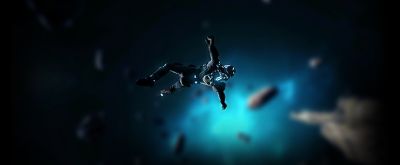 | |||||||||||||||||||||||||||||||||||||||
| 系列 | Design | ||||||||||||||||||||||||||||||||||||||
|---|---|---|---|---|---|---|---|---|---|---|---|---|---|---|---|---|---|---|---|---|---|---|---|---|---|---|---|---|---|---|---|---|---|---|---|---|---|---|---|
| 类型 | Engineering | ||||||||||||||||||||||||||||||||||||||
| ID | 12879 | ||||||||||||||||||||||||||||||||||||||
| 发布日期 | 2013-02-05 | ||||||||||||||||||||||||||||||||||||||
| 来源 | Death of a Spaceman | ||||||||||||||||||||||||||||||||||||||
| 系列文章 | |||||||||||||||||||||||||||||||||||||||
| |||||||||||||||||||||||||||||||||||||||
My goal with 星际公民 is to build a universe that I want to play in day after day, one that fully immerses me in the environment and stories that happen around me.
In Star Citizen’s persistent universe I want events to happen, governments to fall, wars fought and players becoming legends. I want to see a Galactapedia that grows from week to week, reflecting not just the ongoing content Cloud Imperium plans to continually generate, but also the great deeds achieved by players.
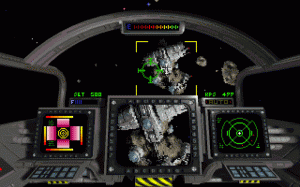
To achieve this sense of a living history, there needs to be a universe where time progresses, characters die, and new ones come to the front. Beyond this, I want people to have a sense of accomplishment when they complete a really difficult trading run or kill an especially infamous pirate. I hate the current game trend in single player games where the game auto-saves every 2 seconds and if you die you just start a few steps earlier. This makes you a lazy and sloppy player. I bullied my way through games like Mass Effect or Gears of War, running in guns blazing, knowing if I died I would always just re-spawn a few steps earlier. In Wing Commander or Privateer, you had to complete the mission to move on. There were no mid mission saves. This created a sense of anxiety towards the end of the mission if you were badly damaged and your shields were low, but if you managed to limp home successfully, you felt a sense of accomplishment. Without the risk of losing something you’ve worked hard towards, the sense of achievement is cheap.

The last single player game I played that give me an extreme sense of accomplishment in beating it was Demon’s Souls. How they handled death and re-incarnation of your ghost / body was consistent with their world and fiction and because I couldn’t save mid-level, clearing a level, especially after a difficult Boss fight was immensely satisfying. It was also one of the most frustrating games I’ve played! I think Demon’s Souls was too much on the “punishing” end of the difficulty spectrum, but it really did remind me of the value of having something to lose when playing. You can’t have light with dark and you can’t have reward without risk.
In Squadron 42, this is pretty easy to achieve. You need to complete the mission to move forward and you can’t save while in space. You die you just go back to the previous save point, normally before you launched on the mission.
The tricky part is really how failure is handled in the persistent universe of Star Citizen, as you can’t just set back the game to an earlier point.
The simple solution is that when your ship is destroyed, you manage to eject and drift in space, where you are picked up and returned to the last planet / landing location to claim your new ship sans any cargo and upgrades you had (unless you had bought additional insurance) and head out into space again.
This is the mechanic EVE Online uses, with the extra wrinkle that if another player blows up your escape pod, a stored clone of your character is activated, re-spawning your character and effectively making him/her immortal. In EVE, death is allowed for in the fiction and is balanced out by the cloning mechanism, which allows for loss of property but not your character’s skills (as unlike Star Citizen, your character in EVE has RPG skills that you learn)
The death mechanic in EVE is clever and well woven into their fiction.
But I’m not interested in making EVE 2.0 with cockpits.

One of my goals with Star Citizen is to make it feel very visceral and real. I want to feel the effects of physical damage on my character, loss of limb or other mishaps that can happen in the danger of space. If my character has been through several wars, I want to see the scars on him/her – perhaps a cybernetic arm because one was lost in firefight or the wrong side of a dogfight. I want to be able to walk up to another player in a bar and SEE that he or she is a grizzled veteran with the battle scars to prove it. This is the kind of detail, texture, and immersion that I want to achieve with Star Citizen.
I also feel that if everyone can be cloned easily, it fundamentally changes the structure of the universe. You now have a universe of immortal gods that can’t be killed. Death is just a financial and time inconvenience that has no further consequences. The life and death cycle of humanity is what has brought us our history, our need to “make a mark” in our time, to push forward. If I want a living, breathing universe that has a lot of the dynamics of a real world and is inspired by the decline and fall of the Roman Empire, immortality for all is problematic.
The flip side is that while perma-death is realistic, it is not a lot of fun if the first time you’re on the wrong side of a dogfight you lose everything and have to start again.
I want Star Citizen to be immersive AND fun.
The death mechanics that I have in mind keep a feeling of mortality and history without making it frustrating or killing (pun intended) the fun.
The life and death of a Spaceman
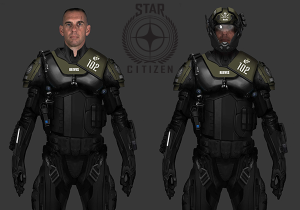
The Character creation screen will be done “in-fiction”. You’ll start the game in 1st person view looking at two bathroom doors – one with a male sign and one with a female sign. Which door you walk through will determine what sex you are when you walk into the washroom. Walking up to the mirror, you’ll see your reflection. Wiping the condensation off of the mirror with your hand (or some similar mechanic) will change / reveal your facial appearance. When you’re happy with how you look, you will exit and return to the UEE recruitment office and officer. You’ll fill in your name on the MobiGlas form and also specify your beneficiary in case of death: this could be a family member, son, daughter, uncle, aunt or someone entirely new (although not another player character).
The UEE Navy has an opt-out option right up until you move onto advanced training (where you would start Squadron 42). So if you just want to jump into Star Citizen, you can opt out right away. If you want some basic pilot training, you could avail yourself of basic and then buy your way out. In this case, the player would just owe a small debt to the UEE that he / she has to pay within a year of game time or become a “debtor” (debtors are denied landing rights on UEE controlled planets and don’t receive any UEE protection until they’ve paid their debt).
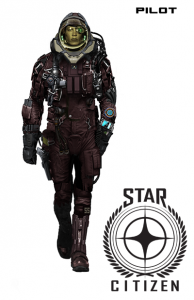
A player enters the persistent universe of Star Citizen either after completing the Squadron 42 campaign (which doesn’t need to be successful), or by opting out before advanced training and going straight into the private sector.
Most players should have some kind of basic insurance, whether it’s lifetime hull insurance for everyone that has backed so far, or a limited duration insurance that will come with later ship packages. A player will even be able to take out a small loan to help finance his/her exploits (with the same penalties for nonpayment described above)
You will be able to run “training simulations” in the simulator module in your hangar (think of this like the arcade game in the Pilots’ Ready Room in the original Wing Commander) to practice your combat skills with no penalty (but of course there is also no financial reward here either).
When you venture out into space proper, you do put your character at risk, but it will be a long term one, not an immediate one.
I see each character you play having the ability to “die” multiple times before the character is finally put to rest. Think of this like “lives” in an old school arcade game. Science in the future is far more advanced than today. Medicine has the ability to bring people back from what would be considered dead in today’s world.

If you lose a dogfight and your ship is going to blow, you have a few seconds to eject. If you manage to eject safely and someone doesn’t blast your ejected avatar, you won’t have even used a “life”. You’ll end back up at the last planet you docked on, with a new ship courtesy of SystemWide Insurance. You’ll have lost your cargo and any upgrades (unless you managed to insure those and you were destroyed in a system with a risk level at or below your insurance rating)
If you don’t manage to eject in time, or someone blasts your ejected character (which carries a harsh penalty if you do this in “civilized” space), your badly charred and almost dead avatar is recovered and you wake up in a med bay.
This is also true if you are killed in a boarding action and your teammates can’t or don’t recover you. If this happens it is assumed that your dead body was evacuated into space and then recovered.
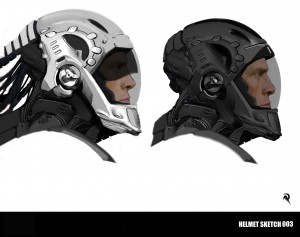
Every “death” creates wear and tear on your body. Depending on where you were hit and how you died, your character may require a new body part, which can either be cybernetic or organic. Eventually after too many deaths, your character’s body will just give out, and instead of waking up in a med bay, you’ll be attending the funeral of your fallen character from the eyes of the beneficiary you specified when originally creating your character. If your old character has done something noteworthy (akin to an in-game achievement), his headstone might read “Here lies Chris, discover of the Orion 2 jump point, slayer of the Dread Pirate Roberts, and a Citizen of the First Order.”
There will also be opportunities to regain some lives or do a reset. Some of this could be through in-game missions or it could just involve paying a lot of money to a specialist on a remote med planet that is doing stem cell research.
Because of how Star Citizen works, the death of your character is not as catastrophic as it would be in a traditional RPG. If you want to think about it in terms of RPG conventions, the character that you are leveling up and customizing is really your spaceship. Your avatar is really just a visual representation of your in-game character, and because Star Citizen is skill based, the loss of your character is more a cosmetic and textural outcome, especially as almost all of the assets you’ve worked hard to accumulate pass on to the beneficiary that you specified when creating your original character.

Reputation and faction alliances pass on to your new character, but slightly diminished. If your original character was a pirate, then the new one will also be aligned with pirates, but not as much and will still be on the UEE watch list. No slate will be wiped clean, but if you want to change your allegiances, this would be the start. This matches life, where the son of a criminal has to deal with the bias of people thinking he is going to be like his father, or a son of a cop is assumed to be on the side of law and order.
What I like about this system is that it creates a sense of mortality and history. No one’s character will die right away. It will take some time to get to that point, but players will feel a sense of risk and so will think twice before needlessly risking their lives, as they don’t want to burn through their “lives”. You’ll also be able to see visually how battle scarred someone is – perhaps having an eye patch or a cybernetic arm could be a badge of pride that you’ve been to war and survived.
When a character finally does shuffle off the mortal coil, the player hasn’t lost what he has really put in the game time to build up – his ship(s), equipment and other assets. These pass to the next of kin / beneficiary. And there is a successor to carry on the family legacy or to avenge the deceased character. (“My name is Inigo Montoya. You killed my father. Prepare to die!”) This will hopefully create a competition between players to see how much they can achieve in the life span of their current characters. The ones that achieve greatness via killing a Star Citizen unique NPC or taking part in a unique event, like discovering a new jump point or system, are recorded in the Galactapedia and become part of the universe lore and history.

This doesn’t just apply to a player character. For me, it’s vital that there are non-player characters (NPCs) are both unique and can be killed. In a single player game, no one minds that many other players have completed the same quest and killed the very same boss monster because the world only revolves around you. But if you take the same quest in a MMO, which is meant to be a shared persistent universe, knowing that the next party will kill the very same boss in the same spot breaks the “suspension of disbelief”. Most MMOs just accept this as the price you pay with having many thousands of players – all expecting to be a hero.
Not Star Citizen.
Major NPCs will be unique. And if they are in a place where they can be killed, they will be killed only once. Think of it as a very hard to win achievement that one player or group of players in the game will ever achieve. If you manage to kill the “Dread Pirate Roberts”, that will be part of your legend, similar to discovering a new jump point or star system. Upon the death of a “boss” NPC, we won’t re-spawn him or her, but there will be someone that steps in to fill the void, so the same area of space may now be terrorized by “The Black Skull”. Major NPC “bosses” will be a unique scalp for a player good enough to beat them. But almost all bosses will have someone waiting in the wings.
While people may feel my proposed death mechanic may hamper their “role playing” of a character they have created an elaborate personal backstory for, I would counter that it will actually enhance it. There is no reason not to have the same backstory, but now it’s the story of your present character and his / her descendants. How many famous people are made and driven by the accomplishments of their parents?
Trust Me!
I realize this game is not going to fulfill everyone’s personal vision of what they think it will be. That would be impossible. There will be some things in Star Citizen’s game design that WILL take people out of their comfort zone. That’s a good thing.
You backed me to make the game in my head and that’s what I’m going to do.
I do listen and when I think something makes sense, I fold it into my thinking as long as it is compatible with the vision I am trying to achieve. But this won’t happen in all cases, so please keep an open mind and wait until you have a chance to play Star Citizen. And even then you should know that we will balance and tweak – that’s the whole point of having such a great community so early – for your feedback and ideas – and if something truly is broken for a large part of the player population we will fix it. We are an online game and frequent updates and tweaks are a core part of the Star Citizen vision.
Question and Answer
Q. What qualifies as a “death”?
Not ejecting before your ship blows up, taking a head shot during boarding, having your ejected pilot or escape pod targeted and destroyed while floating in space.
Q. How any “lives” will I get?
The exact number of “lives” will be balanced as development of the game progresses. The intention is to allow multiple “deaths” before you’re properly dead. So expect to wake up in the med bay at least half a dozen times if not more. And getting to this point won’t be common unless you are participating in a lot of boarding actions or flying in areas where there is no law and order. Please note that it will not ultimately be a single, static counter: taking different risks and dying in different ways will impact your overall survivability at different rates. Remember, the key to Star Citizen is visceral realism: so while the system works this way under the hood, there’s not going to be a “life counter” at the bottom of your screen!
Q. What happens on a disconnect or rage quit? Do I lose a life?
When you disconnect (or otherwise quit in flight) the server attempts to take you to “auto pilot”. If you’re in a space instance (i.e. not already in warp/ auto pilot) and close enough to a hostile the server will attempt to gain enough separation to enter auto pilot. If it’s successful the server will then place your ship back on the planet you last landed on. If not, and you haven’t managed to reconnect to your AI controlled ship before the hostile destroys your ship it is assumed you ejected successfully and will be returned to the last planet you landed on. If you have insurance will have a new hull waiting for you. We will monitor player’s disconnects and if we feel like you are “gaming” the system we may enact a “death” penalty on you and decrease your internal life count.
Q. What are the penalties for targeting an ejected pilot?
Players who target helpless ejected pilots in civilized space that don’t have an official UEE death bounty on their heads are the scum of the universe and will be treated as such by the authorities and marked for death by other players. Pilots who shoot down ejection pods will have trouble navigating civilized space because the police will be on their tails… and they’ll have trouble in the lawless regions, too, because there will be heavy government bounties on their heads (in addition to any player bounties that might be added.)
Q. How long do I float in space before being “rescued”?
When you eject in an active battle instance you can float and watch the action. You can activate your rescue beacon at any time, and when there are no hostiles within a certain distance the game will fade out, then fade up with “… a little time later” and have an in-engine cinematic of your pilot / pod being tractored in to a rescue and recovery vehicle. The game will then cut to the last planet you “saved” on, and you looking at your new replacement ship (assuming you have insurance).
Q. What happens with a “head shot” in boarding?
A head shot is more likely to be fatal than any other injury! Boarding a ship is an extremely risky proposition… you can gain a valuable prize by capturing another player’s property but you’re putting yourself at the most risk possible. It’s possible you’ll just lose an eye or a jaw… but there’s also a very small chance you’ll take a laser to the brain and be dead forever. Taking a head shot while defending a ship is usually less fatal: defending ships will allow their casualties more immediate access to medical facilities.
Q. How will you counteract griefing?
We believe this system will actually dis-incentivize griefers: If you’re a player who wants to camp out in a safe area to kill new players, you’ll quickly have a bounty on your head, and legal PvP will be authorized on you. If you target ejected pilots, lethal force on your ejected pilot can be authorized too. Attempting to grief new players will probably hasten your character’s death a lot quicker than the new players you’re trying to terrorize. We feel that by giving harsh penalties to people that target ejected pilots, allowing most injuries to be survivable, letting players upgrade for survivability to their specifications will help reduce the incentive to grief. But we’re also aware that everything will need to be balanced once the game goes live. So that’s our most important promise: we will continue to balance this system so that it works rather than allowing it to become a tool for players who want to make the game difficult for others.
Q. How can I reduce my chances of dying?
Ship upgrades will include a variety of systems designed to increase the survivability of vehicle loss, including improved ejection systems, improved space suits and personal shielding, better power plant cores (to give you more time to escape) and various automated systems (so that you can set your fighter to eject you after a certain amount of damage has been suffered.)There will also be an upgrade system surrounding your “battle damage”; if your character loses an eye or an arm and you would like a natural replacement rather than a cybernetic-looking implant, you will be able to pursue these in certain markets. Additionally there may be certain medical procedures or limb / organ replacements that can increase your lifespan (effectively add a few lives back)
Q. Is there any way to opt-out of the death system?
There is no way to opt-out of death in the persistent world, but remember that Star Citizen will include options for running your own server. We’ll allow you the option to set the game to infinite lives in this case.
Q. Will multi-person crews be able to escape the destruction of their ships?
Yes, all spacecraft in Star Citizen are being designed to allow crew members to eject or otherwise abandon ship.
Q. Can I rescue or tractor in an ally?
Yes. If you have room and you recover an ejected friend they can become crew on your ship. In addition if you rescue other players and survive the battle you will get a rescue payment from the rescued pilot’s ship insurance company once you land on the next planet. Space rescue and recovery is standard on all ship insurance policies.
Q. What happens I am captured rather than rescued?
If your escape pod is captured by another player or NPC, your game will continue… but there will be penalties depending on your situation. If you are a criminal and are delivered to a prison planet, for instance, you will need to pay off the authorities to escape. If you are sold into slavery, you will need to buy your freedom.
Q. Are you concerned that the fear of permanent death will scare players away from combat?
No. We’re building a combat game and are going to do everything possible to encourage players to dogfight and otherwise battle each other. In most dogfights, even if your ship is destroyed, you won’t lose a life as it’s very likely you will eject in time. Waking up in a med bay with a new limb should be a rare occurrence unless you really like to live in the most dangerous and unregulated parts of the galaxy. The fear of permanent death will cause some anxiety which will add to the overall experience… but it will be more than countered by the potential rewards. In a world where everyone is vulnerable, no one has an advantage.
Q. I already created a backstory for my character, I don’t want them to die!
We’re letting you know these plans early on so that you can incorporate them into your characters. Note that your next-of-kin need not be family members, for anyone hoping to role play a “lone wolf” character.
Q. Will I need to play through Squadron 42 a second time with a new character?
No, everything you earned from Squadron 42 the first time will pass on: Citizenship, credits earned, starter ship and the like. If your beneficiary was a citizen his/her status will pass on down to you as well with a probation period that you have to perform some actions / missions / job to keep the Citizenship in good standing. You will have the option of playing a second campaign if you so desire, but it will not be required.

